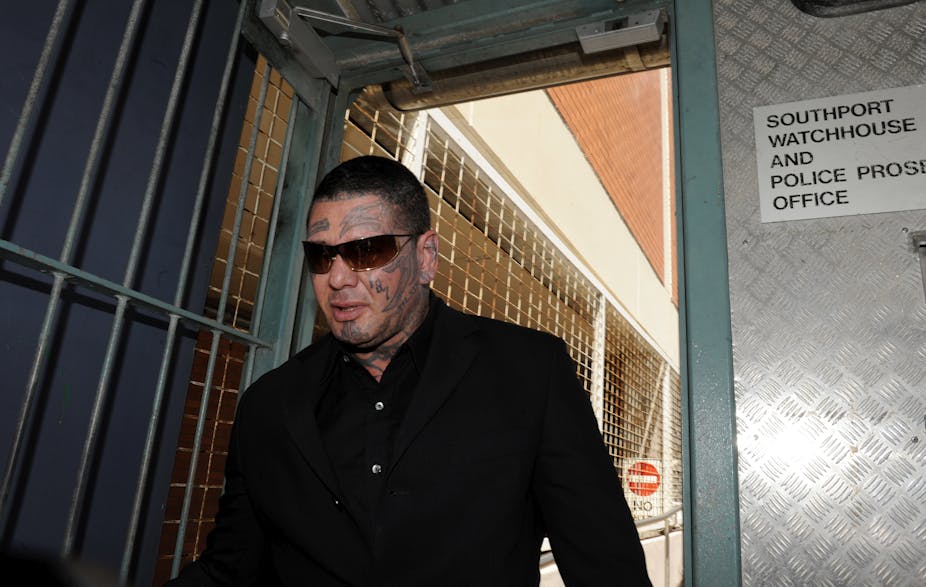Australia has two types of bikies: Conservatives and Radicals.
The Conservative lifestyle involves riding big bikes, drinking a lot, punching your mates and enemies, then falling over and sleeping it off. To a select group of guys, this is tremendous fun. They join outlaw motorcycle gangs because they love this lifestyle and also enjoy the “outlaw” image of being unacceptable to society.
There is also a Radical lifestyle. This is where some people harness the violent skills of bikie gang members and apply it to making money. Bikies are intimidating and willing to use violence on property and people. This makes them extremely useful for extortion and, once they establish their bone fides at extortion, it makes it possible for them to take over organised crime activities.
Money is a fantastic incentive and lots of money is an even better one. So it is not surprising that some Conservative bikies do become radicalised and move into more serious crime.
There are also fake bikies - known as Nike Bikies - who are organised criminals simply pretending to be bikies in order to piggy back on the brand: the Power of the Patch.
Cracking down - but on which criminals?
Since a [violent bikie brawl](http://www.goldcoast.com.au/article/2013/09/28/459028_crime-and-court-news.html erupted at a Gold Coast restaurant on Friday night last week, the federal and Queensland governments have declared war on bikies. As Queensland premier Campbell Newman said on Sunday:
I’ve had enough and Queenslanders have had enough — these criminals seem to have lost touch with reality and we are going to reclaim the streets…We’re going to meet the bikies with an equal response in terms of force. Life is about to get very difficult for them. Every gang member will be assumed to be a criminal and treated as such until this is over.
But if we want to reduce outlaw motorcycle gang crime, it’s important to start by seeing that not all bikies are the same.
Instead, our federal and state governments need to decide whether they are primarily trying to address anti-social violence (the Conservatives), like last week’s Broadbeach brawl, or organised crime, involving the Radicals.
Both are genuine problems - but the Radicals’ impact on our community far outweighs that of the Conservatives.
Organised crime undermines society and causes harm throughout the community by supporting illicit activity and extorting money from legitimate business. On the other hand, Conservative bikie turf wars can cause collateral damage through physical harm to innocent bystanders, but these incidents are extremely rare in comparison.
We do need to tackle both types of criminal activity - but that requires very different approaches.
Street thugs vs organised crime
Organised crime is a problem for Australia, as it is in every nation. Outlaw motorcycle gang members are involved in organised crime and this needs to be addressed.
However, the events that led up to the Newman’s statement that “every gang member will be assumed to be a criminal” involved street fighting.
It may turn out that the brawl was related to organised crime - but it is more likely to have been a result of the normal machismo-based territoriality and vendetta that bikie gangs have been involved in long before any of them delved into drugs production and extortion.
Organised crime must be addressed through good police work, using good quality intelligence and backed up by sufficient resources.
And on that score, there is good news from this week’s state and federal crackdown on bikies. The extension of federal resources and powers to the Queensland police will greatly improve the ability to address the organised crime activities of outlaw motorcycle gangs.
Beating up the risk of bikie beat-ups

Street violence is part of the bikie gang lifestyle. This barbarian behaviour is attractive to its members and very difficult to stop simply through a legal response.
The issue is to move the violence off the streets and allow consenting adults to indulge their lifestyle choice in private. In this case, the increased police presence, even though it is likely to be temporary, should have some effect at displacing the violence away from the tourist strips.
However, the sudden, huge focus on outlaw motorcycle gangs is a beat-up, made easier by how recognisable bikies and the disproportionate fear they engender in many people.
Let’s be clear - outlaw motorcycle gang members are not the only people involved in the drug trade or extortion on the Gold Coast. It is not even clear that they are the primary players in either form of crime.
So it would be folly to focus exclusively on outlaw motorcycle gangs in an attempt to stop organised criminal activity. It may not be the intention of the Queensland government to do this, but what has been said publicly about bikies certainly makes it sound that way.
It should also be remembered that no government in the world has eradicated or even significantly reduced organised crime in any jurisdiction. So it is unlikely to happen in Queensland, no matter how effective the new Queensland Strike Team proves to be.
Similarly, bikies do not have a monopoly of getting drunk and brawling in public. Anyone who has been to a pub in any tourist strip on an average Friday or Saturday night will be able to judge that for themselves. Thus focusing on outlaw motorcycle gangs alone in an attempt to protect the public from street violence would also be folly.
The new laws that have been announced in Queensland and the stronger police response will hopefully do some public good in addressing organised crime, and at least relocate street violence away from the family-friendly areas of the Gold Coast.
But if we want this new crackdown to have more than a passing impact on crime, then we should remember one thing. When it comes to organised crime or violence in our streets, both are far bigger than being just “a bikie problem”.

